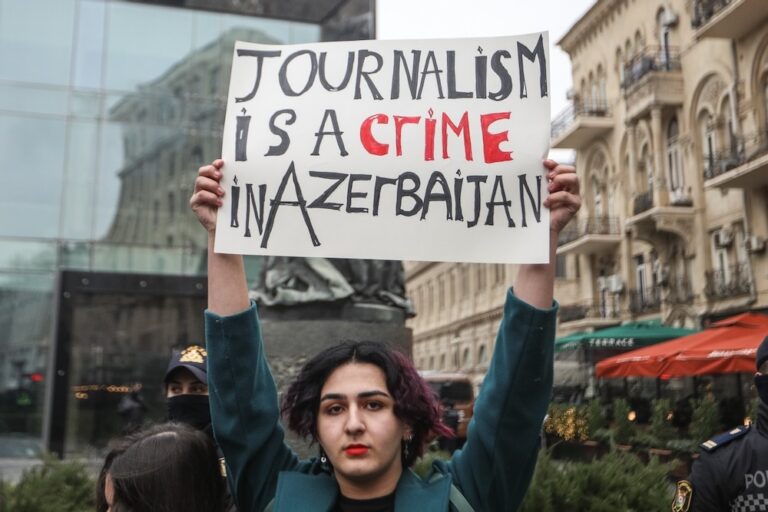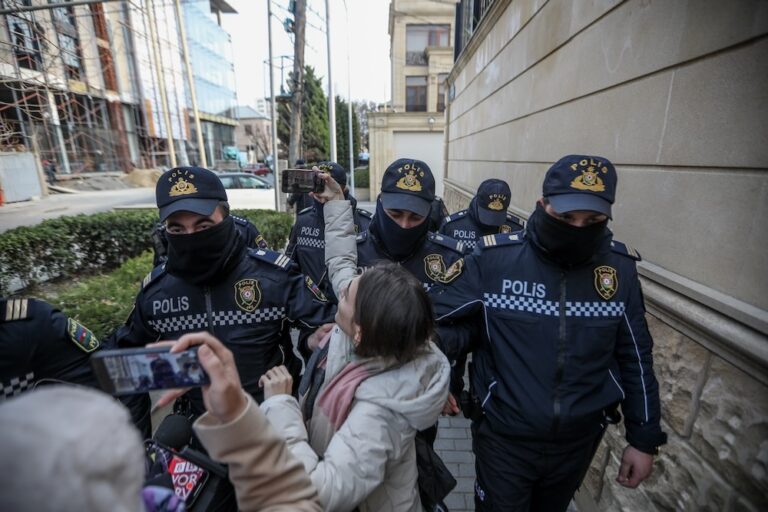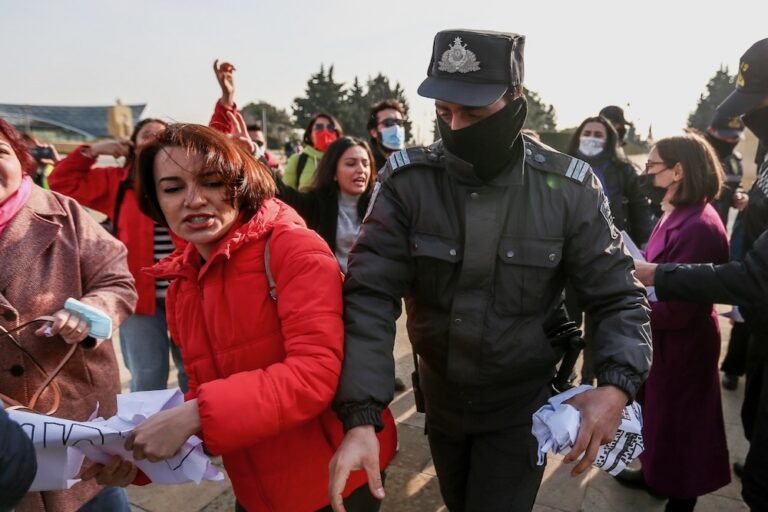As people of Azerbaijan voted this week in the presidential election, Internet content filtering, efforts to sabotage social media activism and interference with the work of journalists, were carried out in an apparent bid to suppress allegations of electoral fraud and criticism of the current regime.
The Azerbaijani authorities must ensure the right of the country’s citizens to freely express their views and choices at the polls, Institute for Reporters’ Freedom and Safety (IRFS) said today. As people of Azerbaijan voted this week in the presidential election, Internet content filtering, violations of the Law on TV and Radio Broadcasting, efforts to sabotage social media activism and – in some cases – interference with the work of journalists, were carried out in an apparent bid to suppress allegations of electoral fraud and criticism of the current regime.
Azerbaijan’s presidential election, held on October 9, resulted in a sweeping electoral victory for the incumbent president, Ilham Aliyev, who received over 84.55 percent of votes. The process leading up to Wednesday’s vote was deeply flawed and featured extraordinary controls that prevented opposition candidates from competing on fair footing. The opposition was largely excluded from state manipulated mass media, journalists became victims of physical attacks orchestrated by police officers, and state administrative resources were used extensively to promote incumbent president, Ilham Aliyev, according to IRFS-conducted media monitoring.
“Wednesday’s election took place against the backdrop of indirect censorship of the media, Internet, mobile Internet, and an intimidating environment that limited freedom of expression and assembly. Throughout the year – and especially during the pre-election campaign – the government was attempting to keep its fiercest critics out of the media and out of politics”, said Emin Huseynov, chairman and CEO of IRFS.
By election day, nine journalists, two bloggers, and two human rights defenders remained behind bars in connection with freedom of expression. Impunity reigned, with more than 30 new attacks against journalists and a lack of progress in investigations of any of the previous hundreds of attacks, including two murders. Rather than fulfilling Azerbaijan’s stated commitment to decriminalize defamation in 2012, on 4 June, President Aliyev signed into law a series of amendments that will extend criminal defamation provisions to online content.
IRFS regretfully notes the lack of political pluralism in traditional media, with the following key violations of domestic and international standards being of a particular concern:
- The broadcasting of the incumbent president’s address to the people of Azerbaijan, less than an hour after the preliminary results of the October 9 election were released by the Central Election Commission, while the second candidate Jamil Hasanli’s opinion was left out, in direct violation of the Azerbaijani law on television and radio broadcasting (Article 3 of the law states: A broadcaster builds its activity on the principles of objectiveness and comprehensiveness of information, free expression of thoughts and views, ideological and political pluralism, neutralism, non-interference with the private life of people, protection of national and moral values, adherence to professions ethics and moral norms and the quality of programs).
- The continuous failure of the Azerbaijani public service broadcaster, Ictimai, to serve the functions of public service broadcasting as stipulated in international standards. Contrary to its mandate envisaged by the “Law on Public Television and Radio Broadcasting”, Ictimai deliberately ignored the election-related press conferences held by independent Azerbaijani NGOs such as the Election Monitoring and Democracy Studies Center and the Learning Democracy Public Union. Article 8 of the law, stipulates, inter alia, the public broadcaster’s “responsibility” “to realize the right of the citizens to get information about significant events in the country and in the world, unbiased and neutral news concerning activities of the governmental organs, political parties, social movements, religious confessions, financial and commercial structures”. IRFS notes that Ictimai TV’s non-compliance with its European Broadcasting Union membership obligation to “provide varied and balanced programming for all sections of the population” and the principles (see: Article 4) of the “Law on Public Television and Radio Broadcasting” shows that ITV has essentially served the needs of the state, largely being used as a propaganda tool of the government with little or no independent reporting.
- The incumbent President Ilham Aliyev’s ongoing unwillingness to talk to Azerbaijani press and his decision not to participate in the televised debates, are tactics that have had a negative impact on the election process in particular, and on the level of public debate as a whole.
- The outrageous spin on the OSCE OIDHR’s press conference on preliminary findings and conclusions concerning the results of the presidential election on AzTV, Ictimai TV, Space TV, Lider TV and ANS TV, in contradiction to media ethics and legislation.
- Deliberate failure of national TV channels including Ictimai to cover oppositional candidate, Jamil Hasanli’s post-election press conference, in violation of Article 3 (main principles of TV and radio activity) and 40 (rights and responsibilities of broadcasters) of the “Law on television and radio broadcasting.”
In addition to violations of internationally-recognized standards of independent broadcasting and election coverage, IRFS notes the following violations of fundamental right to freedom of expression on the very eve of election and on the election day:
Four days before the election, on October 6, journalist Mehman Huseynov’s Facebook profile – which enjoys more than 75,000 followers – was blocked due to false “violations reports” sent from fake profiles, apparently created by pro-governmental social media activists. Due to the fact that both IRFS and Facebook are members of a global ICT coalition, the Global Network Initiative, the issue was resolved quickly. However, on election day, the same tactic was applied to sabotage the conduct of an online opinion poll, “Who did you vote for?”, which is part of a popular Facebook page, focusing on presidential election.
On election day, IRFS observed a hostile attitude toward journalists covering the electoral process in Baku and regions including Ganja, Gazakh, Guba, Lenkoran, Masalli, Nakhchivan, Shamkir, Sumqayit and Yevlakh. IRFS’ staff and freelancers were threatened and intimidated in various ways. For example, security guards and elections commission officials prevented journalists from entering polling places or ordered them to leave on arbitrary pretexts. In most cases, journalists were prohibited from filming or taking photographs during counting, tabulation and consolidation of votes at polling stations.
In addition, a number of foreign journalists – previously known for their criticism of the Azerbaijani authorities – were prevented from traveling to Azerbaijan to cover the election.
Through its membership in the United Nations, the Council of Europe, and the Organization for Security and Co-operation in Europe (OSCE), and through its accession to major international and regional human rights treaties, Azerbaijan is committed to respecting and protecting the rights to freedom of expression and information. It is with regret that IRFS concludes that these rights were not guaranteed in this election – and in fact never since the mid 1990s – and restrictions on these rights did not allow a level playing field for all candidates.
To that end, IRFS continues to call on the authorities to respect freedom of assembly, association, and speech. IRFS demands the Azerbaijani government to immediately guarantee freedom of speech and the free flow of information, and to release all those languishing behind bars in connection with exercising their right to freedom of expression. In addition, IRFS urges the government of Azerbaijan to:
- Allow local and foreign journalists access and free movement within Azerbaijan to cover all future elections, and other international and domestic events;
- Allow the media to freely and independently access all electoral candidates; and ensure all candidates have equal access to the media;
- Facilitate the free flow of information through all communications media, particularly the internet, before, during and after the election.
- Ensure that the public service broadcaster, Ictimai, complies with international standards for public service broadcasting and provides balanced and varied programming for all sectors of the population;
- Put in place transparency in media ownership structures to ensure media, and especially, national broadcast media, are independent and non-partial in their activities.
We also urge the leaders of Council of Europe, OSCE and UN member states to ensure that Azerbaijan is a responsible member of these organizations and is fully committed to their spirit and principles and other binding documents that promote access to information, people’s right to know, democratic values and human rights.
IRFS calls on the European Union, to impose concrete benchmarks for Azerbaijan in exchange for greater political and economic integration. Any framework for advanced relations between the EU and Azerbaijan should include a strong human rights component.


